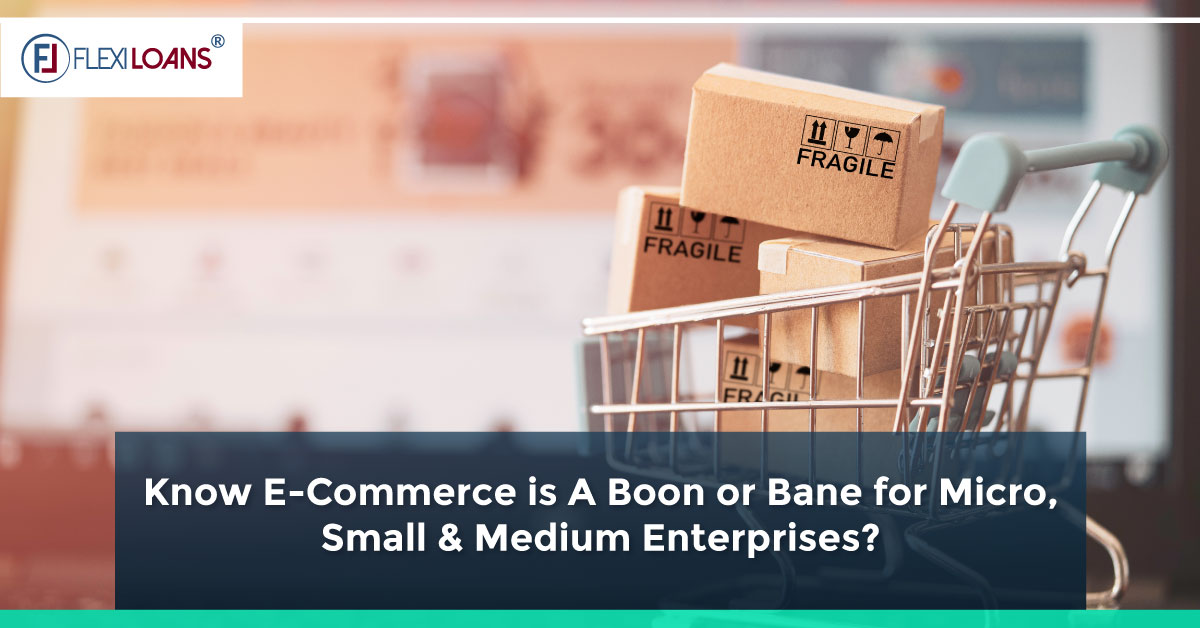Know Whether eCommerce is a Boon or Bane for Micro, Small, and Medium Enterprises
Aug 13, 2021

Introduction
Governments at both the state and central levels have recognised the importance of micro-, small-, and medium-sized enterprises (MSME) and their impact on the Indian economy in numerous ways. Regardless of the industry or sector, MSMEs are critical to their growth.
However, as online shopping has increased, MSMEs have proved their worth by tending to an online audience. The internet was initially a weakness for MSMEs. Over time, it became the foundation for stability, and ultimately, eCommerce factored in as a game-changer.
The MSME sector has evolved as the fastest growing sector of the Indian economy, accounting for a sizable portion of the overall GDP. MSMEs have thrived during the last few decades, posing a considerable threat to established businesses and significantly adding to the country’s industrial development. These MSMEs are developing not only domestically but also globally, aided greatly by eCommerce.
Is eCommerce Benefiting the MSMEs?
ECommerce has a significant impact on the retail industry. It provides several benefits but also some unavoidable drawbacks. By adopting it, MSME may now sell their services and products more widely; their audience is no longer restricted to their local area. They have a platform on which they can conduct business and transactions on an international level.
Since its inception, eCommerce has benefited businesses and companies. It assists MSMEs in reorganising their firms, cutting expenses, and expanding opportunities to achieve a larger profit margin through optimal resource usage. MSMEs gain access to a broad market to promote their products and services because of technological advancements and an increase in internet users.
Additionally, the government has created a variety of programs to simplify getting a small business loan. These programs make it easier for firms to apply for low-interest loans with minimal restrictions. They promote the growth of the MSME sector by providing chances for entrepreneurs to expand their firms.
Is ECommerce a Boon?
If you are still unsure whether eCommerce works for small enterprises, consider this lengthy list of perks.
Increased Revenues
Using eCommerce platforms, MSMEs can increase their revenue and profit margins by expanding their market reach and developing online connections with unexplored consumers. However, most MSMEs take a business loan to increase production online. Additionally, numerous polls and research demonstrate that MSMEs that utilise the internet find it significantly easier than those afraid to embrace eCommerce.
Reduced Operational Costs
As an owner of an MSME, you must control both short- and long-term operational expenditures. It can be achieved by reducing overhead expenses. Additionally, by selling your items through a digital store instead of a brick-and-mortar location, you can work from a home office and save the costs of renting an office space.
By opening an eCommerce store or selling online, you can hire fewer employees, pay no rent, and reach any customer globally.
Enhanced User Experience
They would rather have efficient workflows that aid them in the purchasing process. The sector has been focused on concentrating on user experience design, marketing, customer service, and logistics, among other areas, and being assisted by next-generation technology.
It plays a significant role and has also enhanced client trust. Additionally, it has aided in guaranteeing a superior customer experience. The tech-savvy audience is constantly on the lookout for new features, which enables businesses to quickly reach out to this population.
Twenty-four Hours a Day, Seven Days a Week
Once you begin selling online, your business can operate 24 hours a day, 365 days a year. Even when your customer service team is not on duty, your web store enables you to accept orders 24 hours a day, seven days a week.
On the other hand, physical stores typically close as evening approaches, and you risk missing out on additional orders. However, selling online enables you to process more orders and respond to client issues 24 hours a day.
Globalisation Push
Small MSMEs can benefit from eCommerce by showcasing their products globally without incurring significant growth costs or relocating. ECommerce has become synonymous with sustainability and economic growth for MSMEs. It has aided them in overcoming business obstacles, resulting in a wider consumer base and increased revenue.
Influence of Reviews
In a purely physical retail environment, brands learn slowly from their customers. As a result, gathering input actively is a difficult task. Additionally, prospective clients have few avenues for discovering excellent feedback.
ECommerce sales help MSMEs establish an online reputation by displaying actual consumer evaluations on their website and social media sites, for example. When you have an online business, recent consumers may quickly and easily discuss their shopping experience and the quality of your products by writing a review.
Expanding Your Reach Far and Wide
Selling your products online is the quickest way to expand your business abroad. The global reach of the internet means that the entire world becomes a likely market for your store. Additionally, with a business loan for eCommerce, you can simply expand your activities online to target international consumers.
Time-saving
Consumers find online shopping extremely easy and time-saving, as things are delivered directly to their homes. ECommerce platforms have been incorporating an increasing number of options, such as monthly delivery of daily-use items and same-day shipment. Additionally, it eliminates the necessity to pay in cash.
Is eCommerce a Bane?
While eCommerce is a multibillion-dollar business, it does have some drawbacks.
Increased Sales on the Ground
While online businesses are growing quicker than physical stores, physical stores still account for 90% of retail sales in India. The primary advantage of physical stores is touching and trying things, which is extremely difficult with online shopping.
Customer Service
Because eCommerce companies lack the actual stores that traditional merchants have where consumers can go to request repair or replacement, they can incur a loss. When opposed to internet shopping platforms, physical businesses help owners to develop deeper client relationships.
Cyber Assault
Due to the eCommerce websites’ reliance on the internet, they are particularly vulnerable to cyber-attacks. Online payments can be risky. Occasionally, the bill amount is deducted twice, and the refund takes a long time to process.
Why is the eCommerce Sector Considered to Possess a Huge Potential?
Over the next few years, the eCommerce business is sure to experience explosive expansion. The MSME sector will unquestionably lead the growth. Other factors contributing to the scaling up of this industry include increased industry investment, M&A activity, and government initiatives.
The present COVID-19 outbreak has given the sector a boost. Based on the current scenario, most of the growth will be concentrated in the beauty, personal care, food and household items, electronic commerce, and fashion sectors.
Key Features of eCommerce
Trends Observed
Physical stores are increasingly combining with the eCommerce sector. The term “brick and mortar system” refers to physical stores. Consumers favour internet shopping for certain items, such as furniture and office supplies but prefer physical stores for others, such as grocery and food items.
Discounts Available
Many people view the reductions as detrimental because they are applied to slow-moving, perishable, long-term inventory holdings. Occasionally, a discount is made to compete with and eliminate a good product. The seller bears the cost of the discount. Therefore, eCommerce websites must adhere to high standards and deliver a high-quality service. It is advantageous for both parties, the seller and the customer.
Excellent Competition
The eCommerce companies are constantly working and competing with one another to provide superior customer and manufacturer experiences. India has a great deal of potential for supporting the eCommerce industry. Indian eCommerce is always growing in popularity as more investors from foreign lands arrive.
A Balanced Perspective
Everything in excess is dangerous. While there should be an expansion in the eCommerce sector in India due to the rapid improvement of technology, it should be done within the confines of established standards and laws. While a well-supervised eCommerce market will benefit the economy, an uncontrolled market may prove to be a curse, impeding the country’s prosperity.
Therefore, we can state categorically that physical stores will not vanish. Instead, the current trend shows that brick-and-mortar retailers and the eCommerce sector will collaborate in a win-win situation.
Scope of eCommerce
There is a constraint when determining the scope of eCommerce. All conventional goods now available on the market are incompatible with online transactions. Numerous businesses that dealt with digital products discovered that eCommerce was a good fit. However, all other businesses are gradually adopting eCommerce to increase their efficiency.
eCommerce can be utilised to sell physical goods, particularly those with a high value-to-weight ratio. Additionally, they can be used to reach remote regions. They are capable of crossing national borders. Through the use of eCommerce, individuals can undertake a variety of economical transactions over the internet.
Conclusion
The recent crisis has impacted every area of the Indian economy, but particularly the micro-, small-, and medium-sized enterprises (MSME) sector. All these programs and efforts aid in the growth of MSMEs and provide a platform for them to promote their products and services. The pandemic-related shutdown caused havoc in the MSME sector, resulting in significant losses and, in some cases, closure.
ECommerce enables MSMEs to grow their income, profit margins, market reach, marketing and communication capabilities, and consumer feedback to continuously improve their products and services. While MSMEs in India do not have an online presence, they participate in online sales in the country. Further, in the light of the current COVID-19 scenario, many consumers are choosing online buying as the safer option.
In general, eCommerce contributes to transforming the connection between businesses and consumers, acting as a facilitator between the two. With their ever-changing technologies, MSMEs are prepared to meet future difficulties and provide a definite competitive edge to other sectors.
To pay additional business expenses, you can apply for an SME loan for business from FlexiLoans. We offer a small business loan with longer payback terms and customisable EMI options. If you want to expedite your processing and disbursement, you may apply for our online business loan.
Rest assured that we offer a competitive business loan interest rate. Visit our website or give us a call now to learn more about our MSME business loan!









